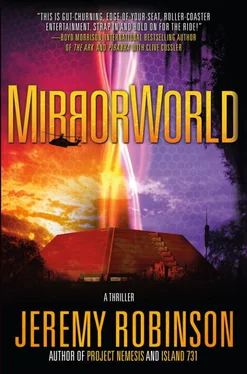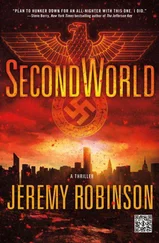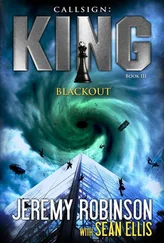The man shrugs. “I’m not sure what she does and does not know.”
“Because she’s out of her mind, or because she’s sedated around the clock?”
His face seems to melt, some invisible force tugging his lips into a frown. This is his daughter. “Both, I suppose.”
We stand there for a moment, watching the motionless Maya. Once upon a time, the two of us were a part of her life, but now… now she’s an anxiety-ridden, self-mutilating vegetable and I’m what? I’m a mystery. Time for some answers.
“I’m done,” I say, and leave the room.
He lingers for a moment but then follows, overtakes me with the awkward shuffling walk of a man whose knees don’t work well anymore, and heads for a pair of doors I recognize. We stop in front of the Documentum door. He swipes his key card and we enter.
The vast, dark room glows dully from the light provided by the glass tubes. The space looks the same as it did before, a collection of dead people floating on the left, empty vessels awaiting occupants on the right.
I’m confused when he stops. “I’ve already seen this.”
“You have seen the victims,” he says, motioning to the bodies. “Like Maya, they got too close to the other side, saw too much, or were driven to madness for any number of reasons I can only guess at. You’ve witnessed the effect the Dread can have on people who lack your fearless nature, which is nearly everyone on this planet.”
Lyons waves his hands at the empty tubes. “But did you see the collection?” He looks at me. “Granted, all I can see is empty containers, but you…”
He wants me to look with my new senses. I blink, shifting my view. Invisible icicles impale my eyes, the pain like brain freeze, but far worse. The jolt makes me flinch, but I’m ready for the pain this time and look beyond it, peeking, once again behind the veil. When I do, Lyons steps away from me a touch but says nothing. And I pay him no heed. I can’t. The sight before me is unholy and captivating.
Lyons walks up to one of the tubes, which to him appears empty, and raps it with his knuckles. “The glass, like the windows on the outside of this building, is laced with oscillium.”
All but seven of the tanks contain a Dread. I see three bulls, crammed inside their tanks, several of the smaller pugs, and another four or five different types, all dead but without any obvious wounds. Like the living Dread, they’re all shades of dark gray and black, but the mesh of glowing veins is now the color of rotting spinach.
“If you can’t see them, how do you know they’re here?” I ask.
“The goggles you saw earlier filter and shift frequencies, allowing us to see them. Only partially. Like shadows,” he says. “Unless they’re already close to our frequency of reality, then they become clear. But even in death, viewing them for extended periods is not advisable.”
I remember the effect a quick look in the stairwell had on Katzman. “Because you might go nuts.”
He nods. “In death, the Dread no longer actively project fear, but there is residual… discomfort created by viewing their frequency of reality. Researchers who have spent even a short amount of time studying the corpses are far more susceptible to their influence. As a result, we have very limited data on their physiology and haven’t been able to perform any experiments of note… aside from you. I have only looked once. Those who have risked more… Well, an excess of fear can break the human mind. It’s what happened to the people you see in this room. It’s what happened to Maya.”
“You knew her well,” I say, luring him toward honesty.
“Who?”
“Maya. Not even Allenby used her first name.”
“We were close,” he says and turns to me. “As were you and I.”
He’s nearly being honest now. Perhaps the subject of Maya is simply too painful for him? Despite knowing he’s my father-in-law, I have a hard time picturing the two of us kicking back with a couple of beers or playing a game of Cranium—Shotgun Jones’s favorite. “If you can’t see them, how do you know they’re still there? Or that they aren’t simply unconscious? Or biding their time?”
“Sensors,” he says. “We’ve learned how to detect their presence.”
“Bioelectromagnetic fields?” I guess.
He squints at me. “Allenby has told you a lot.”
You have no idea, I think, and say, “But how did you kill them?”
He twists his lips for a moment. “The foyer you passed through at the main entrance. Did you notice the delay?”
I nod. The second set of doors took a few seconds to open.
“You were being scanned. Had your bioelectromagnetic field registered as Dread, you’d have been bombarded with microwaves. The roof elevator is the same.”
“Microwaves?”
“Various types of radiation and electricity have the same effect on them as they do on us. Unlike most elements, some forces exist in all frequencies, to some extent or another.”
“And if there had been a Dread inside with me?”
“Alone, the beast would be killed. If a human presence is detected, the first set of doors would have opened again, allowing you and the Dread to leave.”
“And each of these walked into your trap?”
“Slow learners,” he says, but he’s still not being fully honest. Many of the dead Dread have wounds that being cooked from the inside out doesn’t explain. I let it slide, though.
“They follow people, you know. Torment them.” His voice takes on a dark tone. “I know that fear is lost on you, but for the rest of us it can be a nearly insurmountable force. The Dread seep into people’s lives, pushing fear, breaking minds. And they don’t discriminate. Men, women, children. Everywhere in the world. People try to ignore them mostly, and often succeed, blaming their presence on the wind, a settling house, coincidence, imagination, nerves. Or we create stories, myths, about fairies, aliens, ghosts, and other things that, while frightening, are easy to write off. We have hundreds of defense mechanisms that keep us from acknowledging the Dread are real and present. And who can blame us. Life is easier for those most able to ignore the truth. But for those who acknowledge the darkness and who refuse to cower to it, they become targets, trying to stand but being stepped on, pushed down again and again.”
He’s seething, talking about himself now. The trials of his youth. The passion that drives him. More private information set free by Allenby’s loose lips.
He takes a moment to catch his breath, then motions to the collection of Dread. “Most of this bunch came in following employees. After a few months, they stopped trying. Neuro Inc. is currently the only place on Earth you can be truly free of their presence.” He frowns at me. “Until you exposed a chink in our armor. We’re lucky it was just the bull. He was hard to miss.”
“What was it doing?”
“Based on the data from sensors around the building, we think it was just excited to be inside, like an overactive dog. It was running about because it could.”
I’m not so sure that’s true, but the time to open that can of worms hasn’t come. “Then you don’t think they’re smart?”
“Oh, they’re intelligent. There’s no doubt about that, but they’re also instinctual, reacting on primal urges, to intimidate, bully, and dominate their rivals.”
“Humanity,” I say.
He nods and starts toward the laboratory doors at the back of the Documentum room. “It’s more complicated than that, but there is more evidence than you’d expect. We’ve gathered a database of statistical and anecdotal evidence. But it’s the testimonial evidence that’s most intriguing.”
“You’ve talked to survivors?” I ask.
Читать дальше












